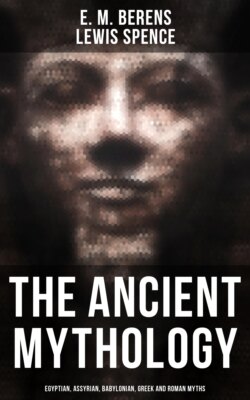Читать книгу The Ancient Mythology: Egyptian, Assyrian, Babylonian, Greek and Roman Myths - Lewis Spence - Страница 139
На сайте Литреса книга снята с продажи.
Lamentation Rituals
ОглавлениеOn the occasion of any national or popular disaster, such as defeat in war, the appearance of a pestilence or an eclipse of the sun or moon, a certain formula of lamentation was gone through, which was thought to have the effect of lessening or averting the malign influence of evil powers, or the punitive measures of an angry god. This formula varied of course with the deity or demon who was considered to have caused the calamity. Many of these ancient lamentations are written in the Sumerian tongue, which witnesses to their great antiquity. From them it would seem that the Babylonians were of the opinion that if the people had in any way sinned, the gods averted their faces from them, and departing from their neighbourhood left them a prey to calamities of all kinds. A definite ritual accompanied these formulas, one of the provisions of which was fasting, and purification ceremonies of a very elaborate nature were also celebrated by the priests, probably in the hope of symbolically washing away the sin which had so offended the gods.
The formula most in use in these propitiatory ceremonies was that which obtained in the sacred city of Nippur, and particularly in the temple of E-Kur. The monotony of these laments is typical of ancient Semitic worship. They describe the disasters that have occurred, and piteously beg that the gods may be appeased. Only now and again in perusing them does a bright line or a picturesque phrase capture the eye and fire the imagination. A paraphrase of one of them may well characterize the whole. The god En-lil, shepherd of the dark-headed people, is implored to return to his city. He is entreated by the various names of his godhead, such as 'lord of lands,' 'lord of the faithful word,' 'lord of self-created vision,' and so forth. Each separate part of the temple area is alluded to in the request that he will return—the great gate, the storehouse, and the other religious departments. A touching domestic picture is drawn of the deserted homes in the city; where the woman could say to her young husband, "My husband," where she could say to the young child, "My child," where the maiden could say, "My brother," where the little girl could say, "My father,"—there the little ones perish, there the great perish. In her banqueting-hall the wind holds revel, her streets are desolate.
From some of the texts it would appear that the suppliants were ignorant of the sin they had committed, and many so-called 'penitential psalms' are extant in which the stricken one appeals fervently to the gods to release him from the burden of his unknown sin. He weeps, and he is unable to restrain himself. He laments earnestly, and begs through the priest for the divine mercy. These appeals always end in the same way—that is, in the pious hope that the heart and liver of the god may be appeased. With the Babylonians, as with the modern Armenians, to whom they are perhaps related, the liver was regarded as the seat of the emotions.
Occasionally a higher intellectual and ethical plane is reached by these prayers. "Men," says one of them, "are blind: which of them knows anything? They do not even know good from evil." The god is fervently petitioned not to cast his servant off. He is in a deep morass, and he earnestly prays that the deity may take him by the hand, may change his sin to grace, and permit the wind to carry off his transgressions.
